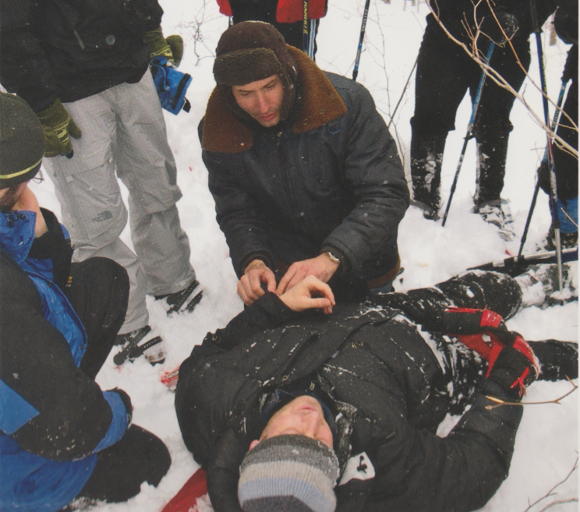The Wilderness & Environmental Medicine Program is a collaboration between NewYork-Presbyterian Emergency Medicine, Weill Cornell Medicine, and Cornell Outdoor Education. Our goal is to apply the highest academic standards to education and research involving medical care in austere conditions.
Through medical student electives, CME courses, and research collaborations, the Program seeks to advance medical care beyond the walls of our institutions. The knowledge and skills of medical care in austere environments are relevant to physicians treating patients in wilderness and disaster settings, as well as to physicians planning to work in global health or regional humanitarian medical response teams.

Curriculum
The medical student elective in wilderness and environmental medicine is designed for fourth-year medical students. This two-week elective involves both classroom-based and field-based learning, covering a breadth of topics such as accidental hypothermia and frostbite, heat illness and heat stroke, high-altitude medicine, animal and insect bites, poisonous plants, injuries and illnesses during expeditions, diving and submersion injuries, search and rescue, field water purification and basic survival in wilderness or disaster settings. The classroom component is based in New York City, at NewYork-Presbyterian/Weill Cornell Medicine. The field component is taught in collaboration with Cornell Outdoor Education and takes place in wilderness settings or natural parks, such as New York State’s Adirondack Mountains. Students hike and camp while participating in realistic, simulated rescue-scenarios, under the close and supportive teaching of faculty preceptors. Beyond practical medical skills, students also develop a sense of teamwork, leadership, and self-reliance, all while appreciating the beauty of nature. A level of fitness to engage in daily hiking, paddling, or outdoor activities, under a wide range of weather conditions, is expected.
Housing & Outfitting
Students are responsible for obtaining their own housing accommodations during the classroom component in New York City (approximately 1 week). Course fees (approximately $675) provide for group equipment and gear in the field, such as tents, tarps, stoves, and canoes, as well as group food and campsite rentals. Students provide their own personal camping gear such as backpacks, sleeping bags and pads. A number of these personal use items may be available to rent through Cornell Outdoor Education. Students should plan their own transportation to the initial starting point of the field component, though carpooling opportunities may be available.
How to Apply
The next elective is planned for September 28-October 11, 2026.
Weill Cornell students interested in applying should add themselves to the waitlist on OASIS: https://cornell.oasisscheduling.com. Visiting students should apply through AAMC VSLO: https://www.aamc.org/visiting-students.
![]() Medical Questionnaire and Liability Form
Medical Questionnaire and Liability Form
Program Contact Information
For additional program and application information or questions, please contact:
Christopher Hennessy, M.D.
Assistant Professor of Clinical Emergency Medicine
Weill Cornell Medicine
Email: cmh9016@med.cornell.edu